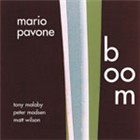Home » Jazz Articles » Album Review » Mario Pavone: Boom
Mario Pavone: Boom
While he has been recording albums under his own name since the early '90s, it has been since '00, with four recordings for the Playscape label, that his best recorded work has emerged. Add to that his newest Playscape recording, Boom , a set that finds him working quartet territory with saxophonist Tony Malaby, pianist Peter Madsen and drummer Matt Wilson, all of whom have worked with Pavone over the past couple years.
Boom is filled with clever ideas, both planned and unplanned. "Bad Birdie," the longest track on the album and one of two pieces written by the late Thomas Chapin, emerges from Ornette territory, combining a quirky extended theme with a high intensity free-swing middle section, where Madsen shows off his encyclopaedic knowledge. Likewise Malaby's solo combines the fire and indirectness of pure abandon with a more historical sense of proportion; he's always been comfortable exploring both the "in" and the "out," and on this record Malaby gets to do both. Pavone is as likely to emphasize strong chordal shots as he is to deliver abstrusely melodic linear thoughts.
Pavone's own compositions run the gamut from the ballad-like "Short Yellow," which might be tender if it wasn't ever so slightly skewed, to the more mathematical "Arc," where the piano and bass establish an ostinato that ultimately breaks down into an improvised section where rhythm is maintained, but in a looser sense. "Bastos" is another Ornette-inspired piece that begins with a quickly-dispensed them that is nothing more than a setup for a relaxed swing where Madsen and Malaby share the solo space.
What makes Boom remarkable and, ultimately, strangely appealing, is its combination of a freer sensibility with a rhythmic approach that usually maintains something resembling established time. Wilson's time may be loose, but it is still impeccable. Pavone himself sits on the fence between more overt interplay with the quartet and, at times, ensuring that a solid foundation is there for the soloist. A thrilling combination of the oblique and the clearly-stated, Boom is another fine offering from Pavone, who continues to move the tradition forward with every record.
Track Listing
Julian; Not Five Kimono; Arkadia; Po; Bad Birdie; Short Yellow; Arc; Bastos; Interior Boom; Out and About
Personnel
Mario Pavone
bassMario Pavone--bass; Tony Malaby--tenor and soprano saxophones; Peter Madsen--piano; Matt Wilson--drums
Album information
Title: Boom | Year Released: 2004 | Record Label: Playscape Recordings
< Previous
The Essential Louis Armstrong
Next >
Beyond Babylon
Comments
Tags
For the Love of Jazz
 All About Jazz has been a pillar of jazz since 1995, championing it as an art form and, more importantly, supporting the musicians who create it. Our enduring commitment has made "AAJ" one of the most culturally important websites of its kind, read by hundreds of thousands of fans, musicians and industry figures every month.
All About Jazz has been a pillar of jazz since 1995, championing it as an art form and, more importantly, supporting the musicians who create it. Our enduring commitment has made "AAJ" one of the most culturally important websites of its kind, read by hundreds of thousands of fans, musicians and industry figures every month.




















